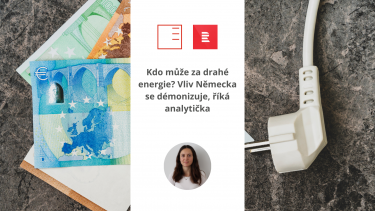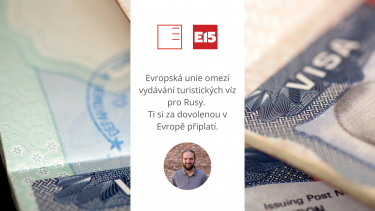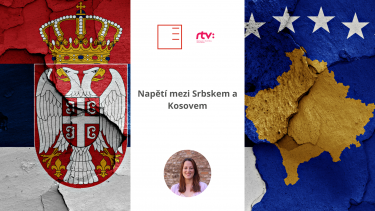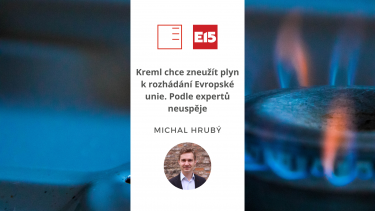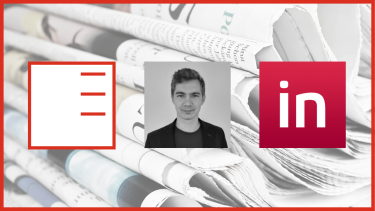INVITATION | EU-Pacific Talks: EU – ASEAN relations: For better and for worse
We would like to invite you to the debate called "EU – ASEAN relations: For better and for worse" in the EU-PACIFIC Talks series. The debate will take place online on our Facebook on Tuesday, September 27 at 11:00.
Show more
ČRo Radiožurnál: Who is to blame for expensive energy? Germany's influence is being demonised, says analyst
At an emergency meeting of EU ministers called by the Czech Republic, ministers came up with proposals on how to tackle rising energy prices in the EU. The meeting was an important demonstration of European unity, says our senior research fellow Kateřina Davidová. At the same time, Davidová points to the overestimated and often demonised impact of Germany's nuclear exit on the energy situation.
Show more
E15: EU to restrict tourist visas for Russians. They will pay extra for a holiday in Europe.
Our Senior Research Fellow Vít Havelka commented for the E15 website on the issue of tourist visas and their restrictions for Russians. At a summit in Prague on Wednesday, EU foreign ministers agreed on a compromise regarding the ban on issuing tourist visas to citizens of the Russian Federation.
Show more
Korea on Point: Neither Eastern Europe nor North Korea but the Indo-Pacific is the Future: The Prospects and Challenges for EU-Korea Relations under the Yoon Ad
Tereza Novotná, an associate research fellow at our Institute, wrote an article for Korea on Time, where she argues, that from a security perspective, the EU-South Korea partnership has been marked by three key topics: the Russian war of aggression in Ukraine, North Korea, and US-China strategic competition. It would be a smart choice for Yoon’s team to continue and expand on the New Southern Policy rather than trying to come up with a new framework. In the end, it will be neither Eastern Europe nor North Korea but the Indo-Pacific which will hold the key to the future of the EU-Korea partnership.
Show more
E15: Ukraine has been resisting Russian aggression for six months. A severe winter will test Western solidarity.
The Russian invasion of Ukraine has been going on for half a year. Despite constant fighting and pressure from Russia on Ukraine, the Russian Federation has failed to conquer Kiev. On the surface, it may appear that the war has stalled, but this is merely a deliberate tactic by Ukraine not to engage in major operations, but to wear down the Russian army. Western unity may be affected by new leadership in Italy and the UK, for example. However, the Czech Republic can play an important role, as it currently holds the Presidency of the Council of the European Union. Our researcher Danielle Piatkiewicz also commented on the topic.
Show moreRTV: Tension between Serbi and Kosovo
Our Senior Research Fellow Jana Juzová commented on the current tensions between Serbia and Kosovo on RTVS Radiožurnál. The Serbian president urged NATO to take care of the Kosovo Serbs and threatened that Serbia would take matters into its own hands if NATO did not. Tensions between Serbia and Kosovo are also gaining momentum in the context of Serbia's efforts to enforce new border rules. Compromises between Serbia and Kosovo have only resulted in an agreement to extend the registration changes until early September. And how does this conflict contribute to Russia?
Show moreRTVS: Some EU countries are returning to coal energy
The return of coal as a source of electricity production is a direct consequence of the Russian aggression in Ukraine. The resumption of coal-fired power stations in Europe means an increase in harmful emissions, jeopardizing the EU's climate targets. EUROPEUM Institute researcher Kateřina Davidová spoke in detail about the energy crisis in Europe, the measures that Brussels is taking to prevent countries from turning to sources of electricity such as coal, and the compensatory measures taken by member states.
Show more
iRozhlas: 'Fresh' first month of the presidency. The Union is relieved that the Czechs have negotiated even a problematic point like gas
In their article on the current European energy policy, iRozhlas.cz refers to the study Gas in Numbers - European solidarity with gas: where does the Czech Republic stand?, which was prepared for EUROPEUM by our researcher Michal Hrubý. Michal Hrubý also commented in more detail for iRozhlas on the necessity of building energy independence from Russia, reducing annual consumption and Czech interests.
Show moreE15: The Kremlin wants to use gas to break up the European Union. Experts say it will not succeed
Russia's Nord Stream 1 pipeline has been operating at only 20 % capacity since Wednesday. According to Bloomberg, Russia will not restore supplies to full capacity as long as anti-Russian sanctions remain in place. Our researcher Michal Hrubý commented for E15.cz that with sufficient gas supplies and appropriate savings, we will definitely get through this winter.
Show moreNovinky.cz: Analysis: How to survive the winter without Russian gas
How do we manage energy in the Czech Republic? What will be the energy situation in the future and how can we save? Our Research Fellow Michal Hrubý commented on this for the news server Novinky.cz.
Show moreStaroměstské náměstí 4/1
Prague 1 - Staré Město
110 00
tel.: +420 212 246 552
email: europeum@europeum.org
https://www.europeum.org

